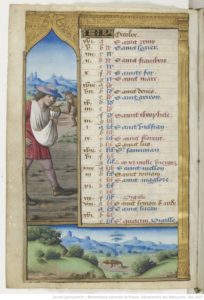
“October”, kalendar page from Les Petites Heures d’Anne de Bretagne (The Little Hours of Queen Anne of Bretagne), by the Maître des Triomphes de Pétrarque. From Bibliothèque nationale de France, Paris (France).
Hugh Latimer also attended Cambridge, and after graduation was elected a fellow of Clare College in 1510. His disputation for his bachelor’s degree was a refutation of the new ideas of the Reformation, but after an encounter with Thomas Bilney, and ardent proponent of reformation ideas, Latimer himself became a supporter of these ideas. This brought him into conflict with Cardinal Thomas Wolsey, Archbishop of York and Lord Chancellor to Henry VIII. When Wolsey fell out of favour for not expediting the annulment of Henry’s marriage to Catherine of Aragon, Latimer’s reputation was restored, and he was appointed Bishop of Worcester in 1535. Latimer fell out of favour again in 1539, when he opposed Henry VIII’s Six Articles, which represented a retrenchment of pre-reformation ideas (including the reaffirmation of transubstantiation and the required celibacy of the priesthood). He was restored to favour once again upon Henry’s death and the succession of Edward VI.
Things changed drastically for both men when Edward’s sister Mary I ascended to the throne in 1553. Latimer was tried for his beliefs in Oxford, where he argued once again against transubstantiation. Meanwhile, Ridley had worked actively to have Lady Jane Grey, Edward’s cousin, to ascend the throne. In his will, Edward had specified that Jane should succeed him, contravening the Third Succession Act. Jane was indeed proclaimed queen, but she was never crowned. After nine days, Mary’s forces prevailed, and Jane was imprisoned, tried for treason, and executed. In the aftermath of Mary’s enthronement, other supporters of Jane were arrested and tried, and so Ridley came to be tried, along with Latimer, in Oxford in 1554. Both men were quickly convicted and condemned to be burned at the stake.
The execution did not go well for Ridley. Despite the attempts of his brother-in-law to arrange the pyre to promote a speedy death, Ridley burned slowly. According to Foxe’s Book of Martyrs, Latimer, who was burned at the same time, said, by way of encouragement, “Be of good comfort, and play the man, Master Ridley; we shall this day light such a candle, by God’s grace, in England, as I trust shall never be put out.”
Ridley and Latimer were executed on October 16. Cranmer himself was tried and convicted at the same time, but his execution (also by burning at the stake) was deferred until March 21. Together the three are known as the Oxford Martyrs.


